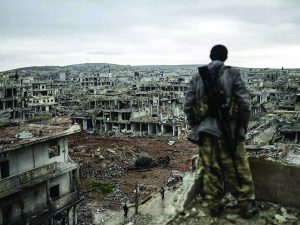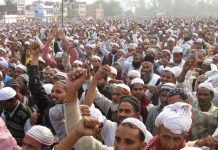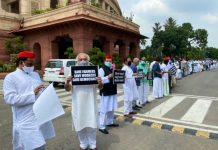 I lived through it, I survived and I cry every day because I saw my country turned into rubble and every other house left to mourn its dead,” a Syrian man told me on a plane as it was approaching Damascus International Airport at around 9:30 pm. Our conversation was cut short by an old man who told us to stop talking about war. “We are all victims”, he announced and gave a long sigh. “We are all sufferers.”
I lived through it, I survived and I cry every day because I saw my country turned into rubble and every other house left to mourn its dead,” a Syrian man told me on a plane as it was approaching Damascus International Airport at around 9:30 pm. Our conversation was cut short by an old man who told us to stop talking about war. “We are all victims”, he announced and gave a long sigh. “We are all sufferers.”
We all went quiet for a while when the plane finally landed with a thud breaking the silence. “Thank God,” said the old man. “I thought this plane would never land.”
As the door opened, a strong gust of wind blew on my face. It reeks of firepower and gives a feeling of melancholy. One would think what on the Earth am I doing here. All the faces I see as I walked into the building may have a story to tell. I could see it their eyes. Hopelessness, fear, uncertainty, confusion…
I couldn’t stand to witness this and my legs gave a shake. I took a cab to a hotel in Sayyida Zainab colony located in the southern outskirts of Damascus.
There was a large portrait of Syrian President Bashar al-Assad at the reception. As I was keenly looking at it, I heard a voice saying: “He is our hero, who has protected our country.” He was the hotel manager. We shook hands and I took the conversation forward. He was a patriot and condemned the critics of Assad. “We want our country to reunite,” he said. “This war was imposed upon us to destabilise the country and ouster Assad.”
I was given a room on the second floor. A single window was an eyewitness to destruction as far as my eyes can reach. The charred cars littered on the streets. Every second count here as making alive out of here is no less than bravery.
During the first night, the sound of gunshots and explosions kept me awake. I learned that the security forces are conducting anti-terror drills during the night to combat any untoward incident in the city.
In the morning, Nadia aged 19 and her mother Sara served me breakfast. Both mother and daughter are working in the hotel since the war has begun in the country. The war has left its mark on them when an explosion took away the head of their family. They have no option left but to fend for themselves.
“If we don’t work, we will surely die,” said Nadia with teary eyes. “This is our only source of income.”
The economic crisis in the country has cast its grim shadow over the people as locals are struggling to survive, who are mostly jobless. Shop owners are grappling with growing inflation and weaker Syrian pound.
“I just make ten thousand Syrian Pounds a day which is not enough to feed my family,” said Hussein, who is selling stones, scarfs and body oils outside the shrine of Sayyida Zainab. Hussein used to earn at least 1 lakh to 1.5 lakh Syrian pounds in a day.
Sayyida Zainab Mosque is the only place where people gather in large numbers despite security threats. The courtyard of the shrine is surrounded by white marbles where thousands of pilgrims used to fill before the civil war.
“The shrines in Syria remain closed during the night as a precautionary measure to protect the cultural heritage,” said a security official, guarding the shrine.
Several times the shrine of Zainab has been targeted, hundreds of pilgrims were killed by the blasts claimed by ISIS. Some parts of the city are literally
unrecognisable. Many Mosques destroyed.
As I travelled to Aleppo known as Syria’s second city, a police officer accompanied me the whole day for my own security. The ancient city has been identified by UNESCO to be one of the endangered World Heritage Sites.
The mixture of old structures including the Umayyad Mosque, one of the rich heritage in Syria. The Great Mosque of Aleppo is surrounded by huge walls and large pillars inside.
At distance of around 200 meters, there is a shrine of Sayyida Ruqayyah, the young daughter of Hussain, son of Ali.
For many Aleppans who are caught up in a conflict they had tried to avoid, the only rule was survival. Now Aleppo’s great economic engine lies in ruins. The sounds of the city dissipated as we drove west, and when the car stopped, there was an eerie silence.
An entire district that once hummed with 1,000 small factories was now abandoned, most of its buildings shattered and burned. I tried to talk to locals here, but they refused to enter into a conversation. “Go away,” one said.
According to the United Nations, around 4 to 6lakh Syrians have been killed and more than 20 million population has been displaced. More than 5 million Syrians have fled to other countries like Turkey, Lebanon, Jordan, Iraq and Egypt and others.
letters@tehelka.com












